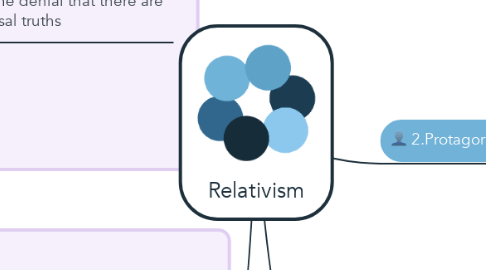Relativism
por Anna Bromely


1. 1.The denial that there are universal truths
1.1. Presented as a principle of tolerance of diversity
1.2. Strengths of this principle is that is it is a principle of tolerance Weaknesses of the principle are of its irrationality and that relativism can seem to revel in its inconsistency
1.3. 2 types: Cognitive (epistemic) relativism Ethical (moral) relativism
1.4. Can often look like contextualism; everything depends upon the context in which truth is asserted
2. 4.Protagoras and Heraclitus
2.1. Plato implies we either retain flux (Heraclitean) and drop knowledge-as-perception or drop flux and retain Protgorean view of knowledge
2.2. Relativism has an attractiveness of truth seeking as it allows us to be more self-challenging.
2.3. If it's fruitfulness that we desire then we should engage with relativism
3. 2.Protagoras
3.1. "man is the measure of all things' or in other words, human beings are the measure of reality
3.2. Knowledge is perception; it is perceived by someone
3.3. Without a perceiver, could there be a perceptible? (Berkeley)
4. 3.Plato
4.1. Plato thinks that knowledge is unchanging and of unchanging things
4.2. Plato rejects the Proagoean position
4.3. Realism rather than relativism
4.3.1. Knowledge must be of what is unchanging and therefor protected against flux
